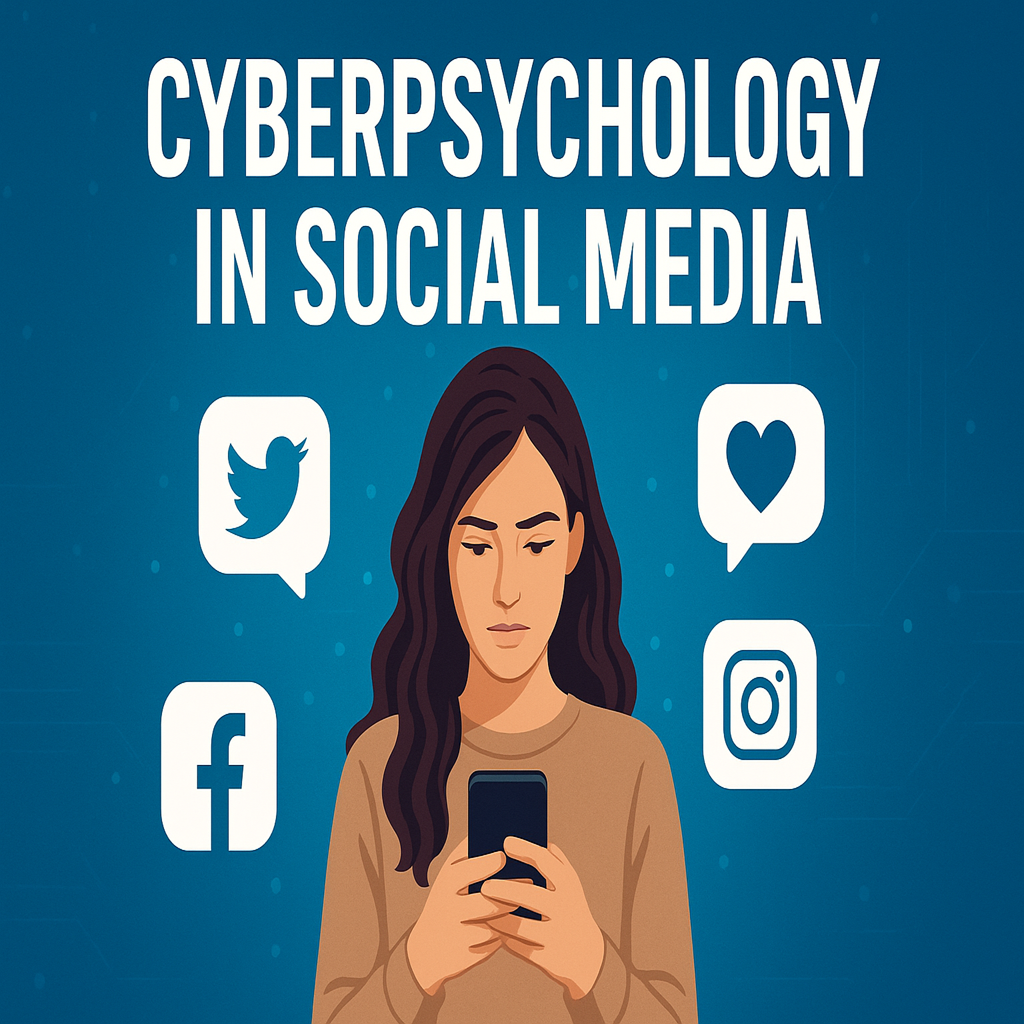
Cyberpsychology and Digital Behavior: Understanding the Mind in the Age of Technology
The 21st century has brought with it a rapid transformation in the way people live, communicate, and think. The rise of smartphones, social media, artificial intelligence, and digital platforms has created new dimensions of human behavior. This new landscape has given birth to a fascinating field of study called cyberpsychology the branch of psychology that explores how technology and the digital world affect the human mind, emotions, and actions.
At its core, cyberpsychology is concerned with questions lik
- How do online interactions shape identity and self-esteem?
- Why do people behave differently behind screens?
- What psychological effects do video games, virtual reality, or social media have on daily life?
- How can technology improve mental health rather than harm it?
To understand digital behavior, one must dive deep into how humans adapt to technology, how our cognitive processes are shaped by it, and how virtual interactions alter social norms.
What is Cyberpsychology?
Together, neuroplasticity refers to the brain’s capacity to human behavior in relation to technology and digital environments. Unlike traditional psychology, which primarily examines face-to-face interactions, this field focuses on online identities, digital communication, and psychological changes caused by prolonged exposure to digital tools.
Key areas of cyberpsychology include:
- Online Identity Formation How individuals present themselves in digital spaces compared to real life.
- Social Media Behavior The impact of likes, shares, and online validation on self-worth.
- Internet Addiction The compulsive use of digital devices leading to reduced real-world engagement.
- Gaming and Virtual Reality Understanding immersion, escapism, and cognitive benefits or harms.
- Cyberbullying and Online Aggression How anonymity fuels negative behavior.
- Human–AI Interaction The psychology of interacting with robots, chatbots, and intelligent systems.
Learn more about Therapeutic Interventions and how can How to heal your past life trauma?
The Psychology of Digital Behavior
1. The Online Disinhibition Effect
Have you ever noticed people saying things online that they would never say in person? Psychologists call this theonline disinhibition effect. Hidden behind a screen, individuals often feel less accountable, which can lead to both positive openness (sharing personal struggles) and negative behaviors (trolling or cyberbullying).
2. The Dopamine Loop of Social Media
Every notification, like, or comment on social platforms releases small bursts of dopamine—the “feel-good” neurotransmitter. This creates a loop ofinstant gratification where users constantly check their devices. Over time, this can mimic patterns of addiction.
3. Digital Multitasking and Cognitive Overload
With constant notifications, emails, and messages, the brain is forced to multitask. While multitasking feels productive, research shows it reduces focus, memory retention, and creativity. This cognitive overload is one of the key challenges of modern digital behavior.
4. Virtual Identities and Avatars
In online spaces, people often craft curated identities. From Instagram filters to avatars in gaming, individuals may create an idealized version of themselves. While this can boost confidence, it may also cause identity confusion or pressure to maintain unrealistic personas.
Positive Effects of Digital Behavior
While much of the discussion around digital life focuses on the negatives, cyberpsychology also highlights many benefits of digital behavior.
- Global Connectivity Technology bridges physical distance, allowing people to connect across continents.
- Access to Information Knowledge is just a click away, making education more accessible.
- Digital Therapy & Mental Health Apps Online counseling, meditation apps, and mood trackers are helping millions.
- Cognitive Development in Gaming Many video games improve strategic thinking, problem-solving, and reaction times.
- Support Communities Online groups provide emotional support for those facing illnesses, grief, or loneliness.
Negative Effects of Digital Behavior
Social media is at the center of digital behavior. Platforms like Instagram, TikTok, and Twitter are not just communication tools; they are psychological environments.
- Addiction and Overuse Excessive screen time affects sleep, relationships, and physical health.
- Cyberbullying and Harassment Online aggression can lead to depression and anxiety.
- Fear of Missing Out (FOMO) Social media creates constant comparisons, leading to low self-esteem.
- Privacy and Trust Issues Sharing too much online can lead to identity theft and privacy violations.
- Reduced Attention Span Short-form content like reels and stories can condition the brain to seek only quick rewards.
Cyberpsychology in Social Media
However, digital life is not without drawbacks. Cyberpsychology warns about the following risks:
- Self-Presentation: People carefully choose what to share, creating a digital highlight reel.
- Validation and Self-Worth: Receiving likes and comments often translates into a sense of worthiness.
- Parasocial Relationships: Followers form emotional attachments to influencers or celebrities they’ve never met.
- Echo Chambers: Algorithms show people content that reinforces their beliefs, creating polarisation.
Gaming, VR, and Digital Behavior
The psychology of gaming is another major area within cyberpsychology.
- Immersion: Virtual reality can make experiences feel incredibly real, leading to both positive therapeutic applications and risks of detachment from reality.
- Escapism: Games offer a break from stress, but excessive reliance can hinder real-world coping mechanisms.
- Social Interaction: Multiplayer games foster teamwork, leadership, and friendships across borders.
- Aggression Debate: While violent games have been debated for years, research suggests environment and personality matter more than content alone.
Digital Addiction and Mental Health
1. Screen Time and Sleep
Blue light exposure from screens suppresses melatonin, making it harder to sleep. Late-night scrolling disrupts circadian rhythms and leads to fatigue.
2. Smartphone Dependency
Nomophobia—the fear of being without one’s phone—is a rising concern. People feel anxious when they are disconnected, highlighting dependency on digital devices.
3. Mental Health Impact
Constant exposure to curated content creates comparison stress. Studies link heavy social media use to higher rates of anxiety, depression, and loneliness.
The Future of Cyberpsychology
A brain exercise routine must be supported by proper nutrition. Certain foods and nutrients promote neural growth:
- Artificial Intelligence Companions – How humans bond emotionally with AI assistants and robots.
- Virtual Classrooms – Understanding the psychology of digital learning environments.
- Metaverse Psychology How immersive 3D digital worlds affect identity, economy, and social norms.
- Digital Detox Movements – Strategies to balance real and virtual life.
Coping Strategies: Healthy Digital Behavior
To protect mental health, psychologists recommend:
- Digital Detox – Scheduling “no-screen” hours.
- Mindful Social Media Use – Following positive accounts, limiting comparisons.
- Sleep Hygiene – Avoiding screens at least one hour before bed.
- Balanced Gaming – Setting time limits while enjoying cognitive benefits.
- Real-World Connections – Maintaining offline friendships and physical activities.
Conclusion
Cyberpsychology is a window into the future of human behavior. As digital life becomes inseparable from daily routines, understanding its impact on the mind is essential. Digital behavior is not inherently good or bad—it depends on awareness, moderation, and mindful use.
The human brain is adaptable. Just as it has evolved to handle language, cities, and complex societies, it can also adapt to the digital age. The challenge lies in using technology as a tool for growth rather than letting it control our lives.
Cyberpsychology reminds us of one simple truth: in a world of screens, apps, and notifications,the healthiest digital behavior is the one that balances virtual connection with real-world meaning.

